What do you think?
Rate this book


311 pages, Hardcover
First published November 14, 2017
" . . . my test for determining the "right" capitalization, punctuation, or spelling of something I’m editing is this: I ask myself, How would I write this in an email to a friend, or in a Facebook status? If the answer is that I would not, under any circumstance, capitalize the word laundromat--even though many dictionaries (and apparently Microsoft Word) suggest I do--or spell goosebumps as goose bumps, then, well, that settles it."The few rules Favilla respects can be counted on one hand, and strangely, she gripes about the overuse, to the point of meaninglessness, of "lol" while arguing in favor of things that are just as worth griping about.
The worst offense? When whom is used incorrectly, like in the sentence They were not sure whom would do a better job. I understand the confusion here, and the assumption that because they is the subject of the sentence there can be only one subject—and therefore only one noun in the subjective case—so of course whom is the object, spelled as such. Unfortunately, English is a little more complicated than that, and the clause do a better job is a hint that the doer of that action must be in the subjective case as well. (Still with me? You wouldn't have to be if whom were eradicated! Just saying.) They were not sure who would do a better job is in fact the grammatically correct sentence. Easy solution? Avoid whom altogether, for a as long as you shall live!
World peace Is a noble ideal, but I’d like to step that goal up a notch: A world with peace and without whom is the place I’d like to spend my golden years, basking in the sun, nary a subjunctive mood in sight, figurative literallys and comma splices frolicking about.
This is a book about feelings, mostly—not about rules, because how can anyone in good conscience create blanket rules for something as fluid, as personal, and as alive as language? Something that is used to communicate literally (literally) every thought, every emotion humans are capable of experiencing, via every medium in existence, from speech to print to Twitter to Snapchat? We can’t. Nearly everything about the way words are strung together is open to interpretation, and so boldly declaring a sentence structure “right” or “wrong” is a move that’s often subjective, and we'd be remiss not to acknowledge that most of the guidelines that govern our language are too. Communication is an art, not a science or a machine, and artistic license is especially constructive when the internet is the medium.
A World Without "Whom" is Eats, Shoots & Leaves for the internet age, and BuzzFeed global copy chief Emmy Favilla is the witty go-to style guru of webspeak.
As language evolves faster than ever before, what is the future of "correct" writing? When Favilla was tasked with creating a style guide for BuzzFeed, she opted for spelling, grammar, and punctuation guidelines that would reflect not only the site's lighthearted tone, but also how readers actually use language IRL.
With wry cleverness and an uncanny intuition for the possibilities of internet-age expression, Favilla makes a case for breaking the rules laid out by Strunk and White: A world without "whom," she argues, is a world with more room for writing that's clear, timely, pleasurable, and politically aware. Featuring priceless emoji strings, sidebars, quizzes, and style debates among the most lovable word nerds in the digital media world—of which Favilla is queen—A World Without "Whom" is essential for readers and writers of virtually everything: news articles, blog posts, tweets, texts, emails, and whatever comes next . . . so basically everyone.
Hey, remember Latin and its roughly 18,239,721 conjugations for every word? (If you don’t, your high school days were much brighter and probably filled with many more cool parties than mine.) We survived the evolution away from declensions, and we will survive this free-for-all era unscathed as well. Simpler doesn’t necessarily equate to a loss of impact or clarity. It just means fewer strict guidelines to follow. And that’s okay. Have you read the news lately? We have enough utterly horrifying, faith-in-humanity—destroying stuff going on in our day-today to worry about.
The fear that our language is deteriorating because we're making calculated decisions to nix periods or because more people are pretending that whom doesn’t exist or they’re swapping emojis for words is as irritating as the performance that die-hard carnivores often put on of a paralyzing fear of trying vegan food. Pull yourself together. It’s not going to kill you, and it might actually make you a more well-rounded person with a new perspective.